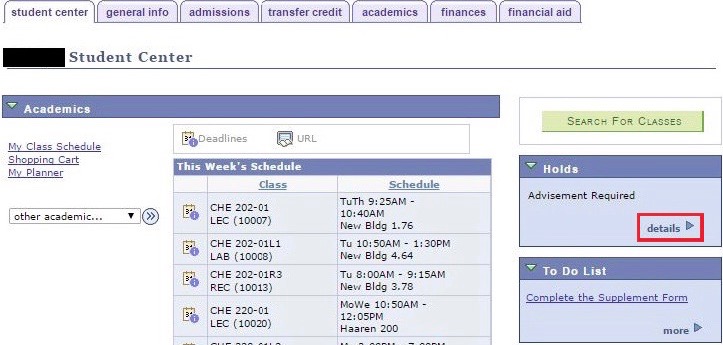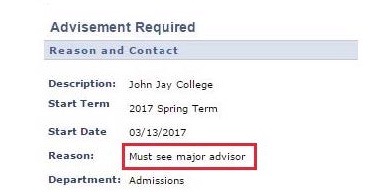Political Science Major Resources
Here you will find:
- Key information about your major
- How and when to meet with your major advisor
- Planning tools that will help you track your progress in the major
- Ways to explore career opportunities related to the Political Science major
Take a few moments to look at the information below. It will help you plan effectively and avoid surprises during your studies at John Jay. Please visit the Political Science Department's website for information, resources, and opportunities!
POL Requirements
You are responsible for the major requirements that were in effect when you declared the major. To confirm the requirements you should be following, go to the Undergraduate Bulletin for that academic year. For example, if you declared the Political Science major in Fall 2015 or Spring 2016, you would click on the 2015-2016 Undergraduate Bulletin. If you declared the major and then left the College for more than one full semester, you’re responsible for the major requirements in effect when you return, if they have changed. Not sure when you declared the major? Find out here.
Attention! Students who declared the POL major with a specific POL concentration before Fall 2020 can follow that earlier version of the major, or switch to the newer version. Students who declared the POL major before Fall 2020 but without a specific POL concentration must switch to the updated version of the major. For further information and guidance, please click herepdf.
Below, find the Undergraduate Bulletin that was in effect when you declared the major.
- 2024-2025 Undergraduate Bulletin - POL
- 2023-2024 Undergraduate Bulletin - POL
- 2022-2023 Undergraduate Bulletin - POL
- 2021-2022 Undergraduate Bulletin- POL
- 2020-2021 Undergraduate Bulletin- POL
- 2019-2020 Undergraduate Bulletin - POL
- 2018-2019 Undergraduate Bulletin - POL
- 2017-2018 Undergraduate Bulletin - POL
- 2016-2017 Undergraduate Bulletin - POL
- 2015-2016 Undergraduate Bulletin - POL
- 2014-2015 Undergraduate Bulletin - POL
- 2013-2014 Undergraduate Bulletin - POL (PDF)pdf
- 2012-2013 Undergraduate Bulletin - POL (PDF)pdf
Major Advising
POL major advising can be done in person or virtually in Fall 2024. Please have a copy of both your CUNYfirst unofficial transcript and your Degree Audit on hand to prepare for your appointment. Advising questions should be sent to: poladvising@jjay.cuny.edu
Fall 2024 POL major advisors:
Professor Katie Zuber
Professor Janice Bockmeyer
Professor Cam Silver
You can also schedule appointments with major advisors using Navigate; be sure to select “Department of Political Science” to see available appointments with the major’s faculty and academic advisors. Advising, resources, student opportunities, and other information can be found at the Political Science Department homepage.
PLEASE NOTE THAT TATYANNA ROBINSON (tarobinson@jjay.cuny.edu) IS ALSO AVAILABLE FOR POL MAJOR ADVISING AND CAN DO GENERAL ADVISING AS WELL.
Tatyanna Fall 2024 advising hours:
Mondays: 9:00 a.m. - 2:00 p.m. (virtual)
Wednesdays: 10:00 a.m. - 7:00 p.m. (virtual; includes walk-in hours from 11:15-2:45)
Thursdays: 9:00 a.m. - 5:00 p.m. (in person)
Students can make POL major advising appointments with Tatyanna using Navigate!
POL majors who need advising during Summer session (June 3- August 27) 2024 can email Professor Maxwell Mak (mmak@jjay.cuny.edu).
Sophomores with 45-59 credits may have a hold on their registration. The hold will be removed when they have a major advising appointment with a Political Science major advisor. This meeting will encourage wise planning and allow students to ask any questions they may have about the major. Students must bring a copy of their current transcript (unofficial is fine) and most recent degree audit. How do you know if you have a major hold? Go to CUNYfirst and complete the following steps:
- Check the Holds box of your CUNYfirst Student Center. If "Advisement Required" appears, click on “details.”

- Click on “Advisement Required.”

- See which type of advisement you need. If you must see a major advisor, then make a major advising appointment following the steps preferred by this department.

Plan Ahead: Graduate on Time
As of Fall 2020, there is a new version of the Political Science major that does not require a concentration. Political Science majors who declared before Fall 2020 must choose one concentration (area of focus) from the following options:
A. Law, Courts, and Politics
B. Justice and Politics
C. American and Urban Politics and Policy
D. Comparative/International Politics and Human Rights
If you are currently in a concentration in the Political Science major and would like to remain in that concentration, you must select courses from that concentration list to complete Part Four of the major. See Degreeworks or the 2019-20 Undergraduate Bulletin for concentration course options.
If you are currently in the Political Science major but would like to follow the new version of the major (Fall 2020), which does not require a concentration, you must fill out a new major declaration form. No approval signature is required, and you can email the form as an attachment to jayexpress@jjay.cuny.edu. Please indicate in your email that you are already in the major but want to follow the Fall 2020 version of the major.
If you were a Political Science major before Fall 2020, but never selected a concentration, you will also need to fill out a new major declaration form to select the new version of the major and email it to jayexpress@jjay.cuny.edu. Again, no approval signature is required. Please indicate in the email that you are already in the major and just want to follow the Fall 2020 version of it.
As you progress through the POL major, keep the following important information in mind:
- Take POL 101 as early as possible, since it is the prerequisite for all major courses.
- Take POL 225 before POL 409.
- We have fewer offerings at night. Night students should speak with a major advisor if they are having issues registering.
- Do not count on courses being available in summer or winter sessions. We offer only a few courses during these sessions. POL 225 and POL 409 are not offered in either winter or summer. Since both courses are crucial to the progression and completion of the major, you need to be aware of this as you do your academic planning.
- Take advantage of early registration windows, especially if you are near the end of your program.
- Remember that you will need at least a 2.0 in the major and at least an overall 2.0 GPA to graduate.
- DegreeWorks degree audit - Use this online planning tool to track your overall progress toward graduation. You will see which of your general education and major requirements are completed, in progress, or still needed. Please be aware that if you are following the pre-Fall 2020 version of the POL major and do not have a concentration declared, your major requirements will not appear on DegreeWorks. Refer to the DegreeWorks FAQs to better understand how to use this helpful tool. Note: be sure to confirm the accuracy of your degree audit with a general advisor and major advisor.
- Political Science Major Checklist pdf- Fill out this printable worksheet to keep track of which major requirements you have completed and which ones you still need.
- Sample Four Year Planpdf - See an example of how you could complete all your degree requirements (major, general education, electives) and graduate in four years! Remember that this sample plan shows just one possible way to combine your requirements. Transfer students in particular should work with advisors to determine a plan that works best for them.
A General Academic Advisor will confirm what general academic requirements you still need, make suggestions about smart course planning that will help you graduate without delays, discuss your interest in adding a minor or second major, inform you about opportunities such as study abroad, discuss general questions and concerns, and make helpful referrals. Visit the Academic Advisement Center's webpage for more information.
Political Science and Careers
Listen to Dr. Jennifer Rutledge talk about the Political Science major, including the robust internship opportunities available to students and how well this major prepares you for a range of great careers, whatever your professional goals may be.
A political science degree enhances students’ understanding of government, politics and policy, and develops critical thinking, research, and writing skills. As a result, it is a great foundation for a wide range of jobs, including but not limited to the following:
- Administrator (corporate, government, non-profit)
- Attorney (see John Jay's Pre-Law Institute for guidance regarding Law School preparation)
- CIA Agent or Analyst
- City planner
- Journalist
- Government relations specialist
- Policy analyst
- Political commentator
- State, local, or national legislator
- Teacher
- Urban planner
For more detailed information on these and other career ideas, visit the Center for Career & Professional Development. CCPD staff are available to meet individually with students and alumni in L72.00 New Building. To request a 45-minute counseling appointment, log on to John Jay Careers Online. 15-minute drop-in sessions are also available Mon-Fri 9 a.m. - 5 p.m. Stop by in person earlier the same day to schedule a drop-in session.
Do you like conducting research about politics and government? Would you like to become an expert about a particular political or policy issue? If you answered “yes” to these questions, consider a graduate degree (MA or PhD) in political science. Speak with a major advisor to discuss your options, and follow our advice for graduate school applicants:
1. Do your research.
- Look for programs with faculty and courses that match your interests.
- Email faculty to express an interest in and ask questions about their program.
- Search for and inquire about funding opportunities. Most PhD programs fully fund their students for at least 5 years, and many MA programs offer funding as well.
2. Write the GRE.
- Most MA and PhD programs require this. Consider taking a prep course, like those offered by Princeton Review and Kaplan.
3. Carefully draft your personal statement.
- Most graduate programs require a personal statement, so yours needs to be excellent.
- Start writing early, and have multiple proof readers (especially your professors).
- Follow instructions; adhere to word limits, formatting requirements, etc.
4. Request letters of reference.
- Most graduate programs require letters of reference from at least 3 of your professors.
- Ask your professors for letters well in advance of the application deadline.Be sure the professor can write you a strong letter—this is most likely to happen when you earned an A in his or her class.
- Help your professors write strong letters: provide them with your transcript, resume, and information about your chosen programs (including where they should send the letter, and by when).